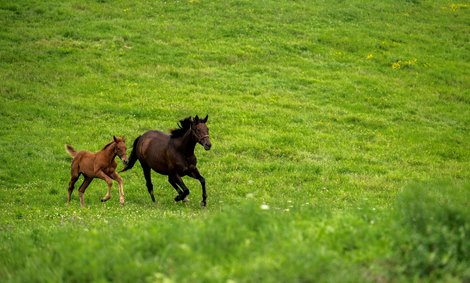Novel research from the Royal Veterinary College In cooperation with Cornell University, in cooperation with the middle and overdue -term loss of pregnancy, a factor for the middle and overdue term have presented a factor for thoroughbreds.
This is the first study that examines the impact of the genomic inbreeding level on the overdue loss of pregnancy of the horse and helps to inform the pairing decisions in order to minimize the risk of miscarriages in the event of whole blood.
Inbreeding is a common practice in horse breeding and in the cattle industry, since people with desirable characteristics are highly valued. However, it is known that excessive inbreeding increases the likelihood of recessive genotypes that have previously been associated with an increased risk of a placenta and lower seed quality in horses.
About 5% -10% of pregnancies of horses end in the early loss of pregnancy, and another 7% of pregnancies are lost between 70 days of pregnancy and 24 hours after the division. So far, however, there has been no final analysis to examine the connection between genomic inbreeding levels and loss of pregnancy in horses.
Therefore, the research team analyzed under the direction of Dr. Jessica Lawson, Alborada Trust Research Fellow at RVC and Professor de Mestre at the Baker Institute for Animal Health at Cornell University, together with former doctoral students at the RVC Charlotte Silton DNA samples of 189 people, including a control group. The study showed that in the middle and overdue station, the thoroughbred with significantly higher inbreeding metrics than British thoroughbred-and-olds showed. However, pregnancies that were lost early in pregnancy showed no significant difference in the inbreeding metrics compared to the adults.
Register Bloodhorse Daily
While the thoroughbred breeders have carefully selected their mating and breeding decisions, this research shows the crucial importance of knowledge in mating decisions in the industry. These results also underline the need for further research in order to further identify and characterize genomic changes that can negatively influence pregnancy.
Mating decisions can be critical for the health of the foals
“This research provides critical evidence that show that the mating of highly -related people has a concrete influence on our breeding operations,” said Lawson. “There is a real risk that a mare will lose their pregnancy overdue in pregnancy and that no foal produces this season.
“The take-home from our work should consist of carefully taking into account the breeding decisions that contain the mating of closely related people, since this can ultimately raise the likelihood that the foal mutations that may not be compatible with life are not compatible. We are already working on the next step to identify these changes, so that more specific advice can be taken into account.”
This research was financed by the thoroughbred Breeders Association, the horse Levy Board, the Alborada Trust and the partial doctoral student hip financing of the Paul Mellon Trust of the Royal Veterinary College for Equine Research.
This press release was edited by Bloodhorse Stab for content and style.


